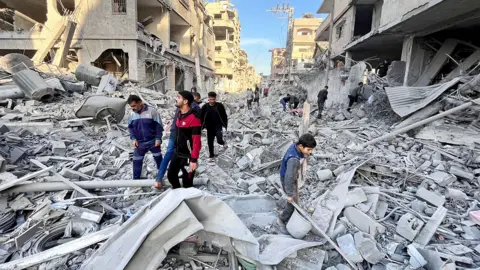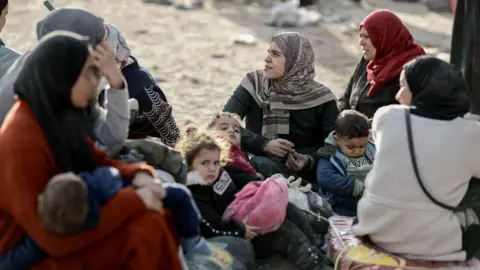Almost no aid has reached northern Gaza in 40 days, the UN said

 AFP
AFPPalestinians “face diminishing conditions of survival” in the northern Gaza Strip besieged by Israeli forces because almost no aid has been delivered in 40 days, the United Nations has warned.
The UN said all its efforts to provide aid to an estimated 65,000 to 75,000 people in Beit Hanoun, Beit Lahia and Jabalia this month have been rejected or blocked, forcing bakeries and kitchens to close.
Earlier this month, a study supported by the UN revealed that there is a high probability of famine in the northern areas of Gaza.
Israel’s military said its six-week offensive aims to regroup Hamas fighters, and to facilitate evacuations and hospital deliveries.
Hundreds of people have been killed and between 100,000 and 130,000 others have been displaced from Gaza City, where the UN said essential services such as shelter, water and health care are severely limited.
Meanwhile, the US vetoed a UN Security Council resolution calling for an immediate ceasefire between Israel and Hamas in Gaza.
The other 14 members of the Security Council voted in favor, but the US said the text did not clearly state that hostages held by Hamas were immediately released as part of a ceasefire.
The resolution “demands an immediate, unconditional and permanent ceasefire to be respected by all parties, and reiterates its demand for the immediate and unconditional release of all hostages”.
Israel said the document was a “decision to appease” Hamas, but France said the decision was “very strong” and called for the release of the hostages.
UN agencies planned to visit 31 locations in the besieged areas of the Northern Gaza Strip between November 1 and 18, according to the Office for the Coordination of Humanitarian Affairs (OCHA).
Twenty-seven were rejected by the Israeli authorities and the other four were severely barred, meaning they were prevented from carrying out all the work they had set out to do.
“This comes as the IPC Famine Review Committee said 11 days ago that the northern parts of Gaza are facing an imminent threat of famine – and that urgent action is needed in days, not weeks,” UN spokesman Stéphane Dujarric told reporters in New York.
“The result is that bakeries and kitchens in North Gaza governorate are closed, support for nutritious food [for children and pregnant and breastfeeding women] stopped, and the refueling of water and sewage facilities are completely blocked.”
Mr Dujarric said access to the three under-performing hospitals also remained severely restricted, amid what he called a “major shortage” of medical supplies and fuel.
On Sunday, a team led by the World Health Organization at Kamal Adwan Hospital in Beit Lahia managed to bring 10,000 liters of fuel and transfer 17 patients, three unaccompanied children and 22 caregivers to al-Shifa Hospital in Gaza City.
However, Mr Dujarric said the aid workers were forced to remove all the food and some of the medical supplies they were transporting at the Israeli military checkpoint before reaching the hospital.
The director of Kamal Adwan, Dr. Hussam Abu Safiya, warned on Wednesday that the situation there will be “very catastrophic”.
The Hamas-run health ministry in Gaza quoted him as saying that the hospital has 85 patients receiving “low-level health care” and that it needs baby food and infant formula to treat the growing number of malnourished people.
Since Tuesday, 17 children have come to the emergency room showing signs of malnutrition and an old man has died of dehydration, he added.
There was no military comment from the Israel Defense Forces (IDF).
But information from the Israeli military agency responsible for humanitarian affairs in Gaza, Cogat, said 472 aid trucks had entered the northern Gaza crossing of Erez West since November 17, without specifying whether any of the aid was allowed to enter the besieged areas.
Cogat also said that he continues to work with international partners “to facilitate the aid response to the people of Gaza”.
 AFP
AFPOn Monday, a boy from Beit Lahia told BBC Arabic’s Gaza Today program that he and his family fled Gaza City after Israeli soldiers dropped leaflets from a quadcopter, ordering them to leave immediately.
“The road from Beit Lahia to Gaza [City] it was rough and we had nothing to walk on. When we arrived, we found nothing… not even food or drink. We headed to the schools but there was no place left because the number of people who were beaten… was large,” he said.
“Because of this, we were thrown into the streets without knowing where to go. We are six families living on the streets, sitting on sand, dirt and debris.”
The IDF said in a statement on Monday that its forces had killed “a number of terrorists in close-quarters incidents and targeted strikes” in the Beit Lahia area last week.
On Wednesday, a spokesman for the Hamas-run security organization told AFP news agency that an airstrike killed two people, including a 15-year-old girl, at a school sheltering displaced families in Beit Lahia.
The agency’s first responders also found the bodies of seven people who died in an overnight Israeli strike on a house in Jabalia, he added.
Israel launched a campaign to destroy Hamas following the group’s unprecedented attack in southern Israel on October 7, 2023, in which approximately 1,200 people were killed and 251 others were captured.
More than 43,980 people have been killed in Gaza since then, according to the health ministry in the area.
Source link




